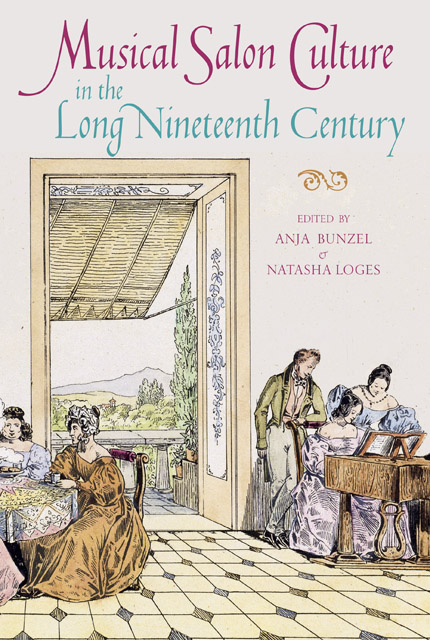5 - Fridays with Malla: Musical Repertoire in the Swedish Salon of Malla Silfverstolpe
Published online by Cambridge University Press: 17 January 2023
Summary
For three decades beginning in 1820, Malla Silfverstolpe née Montgomery (1782–1861) invited leading literary, academic and musical figures to her home in Uppsala for regular gatherings. These ‘Fridays’ (fredagar), as she called them, constituted the most prominent salon in Sweden during the first half of the nineteenth century. Born into an aristocratic family and widowed before the age of forty, Malla – as she refers to herself in the third person in her extensive, posthumously published memoirs – was both independent and reasonably wealthy, possessing the social capital to attract culturally prominent attendees with connections to Uppsala University and the financial capital to serve what she self-deprecatingly described as ‘paltry’ (tarvliga) four-course meals. But more than this, she carefully orchestrated her salon gatherings by selecting the participants and guiding topics of discussion.
Although detailed accounts of extended conversation at her Fridays have not survived to the present day, we know that the evenings typically began with reading various types of literature aloud, which provided grounds for discussion; after the aforementioned supper, the gathering usually closed with musical performance. Indeed, music became a central feature of the salon, as Malla provided space for prominent and up-and-coming musicians among her ever-widening circle of friends to share their performances and original compositions with influential citizens of Uppsala. The present study will examine repertoire by two younger composers to show how Malla’s Fridays shaped contemporary musical production in Sweden – an important aspect of her salon that has not yet been analysed in detail – with a focus on songs growing out of the early nineteenth-century infatuation with folksong collection. Adolf Fredrik Lindblad crafted his noteworthy folksong settings under conditions that developed from Malla’s salon activity, redefining the role of the piano accompaniment and, in one case, pushing the boundary of ‘folksong’ beyond the narrative ballad to include an urban work song. Lindblad also introduced Malla’s salon guests to the songs of a mutual friend, Carl Jonas Love Almqvist, who wrote in a varied and individual idiom that is, at times, highly reminiscent of ‘simple’ folk practice even as it incorporates the concept of the aristocratic salon into itself as a meta-performative layer.
- Type
- Chapter
- Information
- Musical Salon Culture in the Long Nineteenth Century , pp. 79 - 94Publisher: Boydell & BrewerPrint publication year: 2019

